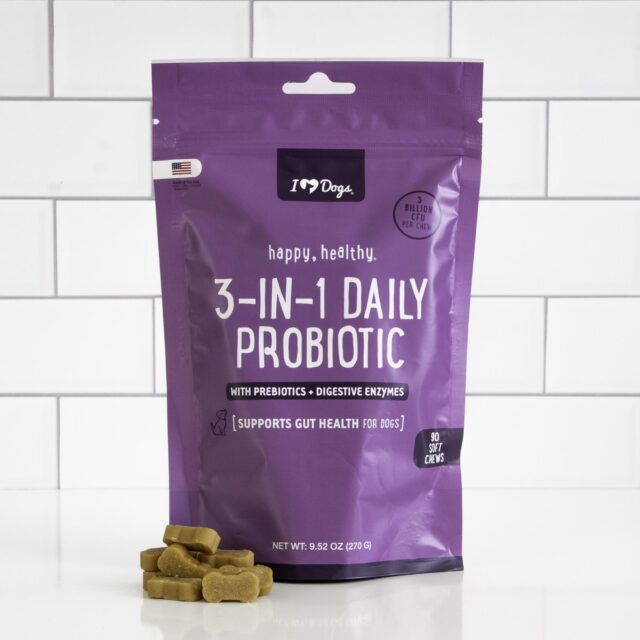Sometimes, an otherwise healthy dog might have a sensitive stomach. They could experience diarrhea, vomiting, or other digestive discomforts when eating certain foods. Sadly, our dogs can’t tell us if their tummies hurt, so we have to pick up on unusual behaviors and symptoms. Luckily, ingredients like bromelain for dogs can help control an upset stomach.
Bromelain can improve your pup’s internal organs in many ways. So, if your dog is having occasional digestion problems, you may want to use a supplement with this ingredient, as long as you’ve ruled out severe causes first.

What is Bromelain?
Bromelain is an enzyme that comes from pineapples, specifically the juice and stems. It was first separated from the fruit in 1891 during a fermentation process. In history, pineapples were most commonly used for medicinal purposes by South and Central American natives.
Humans primarily take bromelain to benefit from its anti-inflammatory properties. It can be used orally to reduce swelling or topically to aid damaged skin. Yet, it can also have added benefits, such as improvements to the digestive tract and immune system.
Humans aren’t the only ones who benefit from bromelain. It’s also commonly used in canine supplements to boost your dog’s health in several ways.
Is Bromelain Safe for Dogs?
Yes, bromelain is safe for dogs when dosed correctly. It’s a natural remedy with very few side effects, and studies show that it has no risk of toxicity for canines. It can be used by itself or given with other enzymes or medications.
However, bromelain can have side effects like any other supplement, so talk to your vet about whether or not it’s suitable for your dog before serving it. While most dogs experience benefits from it, the results can vary for individual canines.

Can Dogs Eat Pineapples?
Yes, dogs can also eat pineapples. They should only eat the flesh, not the core or exterior. Most fruits are safe for dogs to eat, and many of them provide health benefits too.
Small amounts of raw pineapple can provide vitamins and antioxidants to your dog. Pineapple also contains a lot of water, so it’s a good snack for hydration on a hot summer day. However, you should avoid canned pineapples because canned fruits usually have too much sugar for dogs to handle.
Dogs can get bromelain simply by eating pineapple, but it won’t give them enough to reap significant benefits. Giving them too much pineapple could increase their sugar intake too much. So, serve them a canine supplement containing bromelain instead.
What Does Bromelain Do for Dogs?
Bromelain can benefit your dog in so many ways. So, if you’re using it for one specific aspect, you may get some added benefits. Here are four ways bromelain can make your dog feel its best.
Improves Digestion
There are lots of reasons a dog could experience digestive problems, including allergies, food sensitivities, behavior issues, or medical needs. Regardless of what’s bothering your dog’s stomach, bromelain can regulate their digestion to reduce the amount of tummy troubles. This ingredient may also improve the absorption of nutrients in your dog’s body, helping their overall health.
Bromelain is a proteolytic enzyme that can break down protein in the body. Yet, many enzymes get destroyed by digestive juices, so your dog will need to eat a lot of it to notice significant digestion improvements. Most canine supplements contain the ideal amount for your pup’s consumption.

Strengthens the Immune System
Bromelain is a natural pineapple enzyme that can increase the number of minerals in a dog’s body, such as zinc. Zinc can keep your dog’s immune system strong even as they age. Most dogs experience a weakened immune system in their senior years, just like humans do. So, taking a bromelain supplement could make your dog less likely to get sick.
Reduces Pain and Swelling
When your dog experiences some type of pain or injury, its body often produces fibrin and kinins. Fibrin is a protein that’s produced to cause blood clotting when the body bleeds. Then, kinins are chemical compounds that also control blood-related activity. Together, these items contribute to swelling and pain when your dog gets hurt.
When bromelain is consumed, it removes fibrin and kinins. Thus, it can reduce the swelling your dog experiences after an injury or due to arthritis. It works as a natural pain reliever that can be safer than some prescribed medications. It can relieve pain related to wounds, sprains, bruising, muscle damage, and stiffness.
However, you should ensure that your dog’s swelling isn’t related to an underlying condition before relying solely on bromelain. If the swelling gets worse at any point, contact your vet.

Provides Allergy Relief
Bromelain is also considered an antihistamine, which is an allergy relief agent. So, it can help control the symptoms of allergic reactions, such as seasonal allergies and bug bites. An oral supplement can heal skin irritation caused by allergies, but a topical version of bromelain for dogs may be available.
If your dog has allergies to pineapples or similar fruits, bromelain could do the opposite. Avoid this ingredient if you suspect your dog may be sensitive to it.
How Much Bromelain is Safe for Dogs?
There is no exact dosage for all dogs. The bromelain dosage for dogs varies based on your furry friend’s needs and the product you choose. For the safest dosage, talk to your vet. They can confirm the product’s suggested dose or adjust it based on your dog’s age, weight, and medical history.
If you give your dog a chewable supplement, the container will likely tell you to provide them with one to three tablets/chews per dose. If you use a liquid supplement, the dosage will be between 5 and 15 mg per pound of body weight. The supplements are most effective for digestive purposes if they’re given 45 minutes to an hour before your dog’s next meal.
It’s safest to start with a slightly smaller dose than the recommended dose. Then, you can gradually begin giving your dog the ideal amount. That way, you can keep an eye out for any side effects and catch them early on. Most canine supplements have minimal risks, but it can’t hurt to be cautious.
Bromelain Side Effects
Most side effects associated with bromelain are minor and only occur if the dose is too high. High doses of bromelain could do the opposite of the benefits by causing digestive problems and cardiovascular concerns. That’s why confirming the dosage with a vet is crucial before giving it to your dog.

Here are some potential side effects of bromelain for dogs:
- Diarrhea
- Vomiting
- Nausea
- Increased heart rate
- Thinned blood
- Mucous membrane irritation
If any of the above concerns occur while your dog is taking a bromelain supplement, stop giving it to your dog immediately. Even if your dog’s reactions seem minor, they could escalate quickly. Explain the symptoms to your vet so they can suggest a more suitable supplement for your furry friend.
Bromelain supplements for humans have similar effects as dog supplements, but it’s best to only give your pup canine-specific products. Human supplements may contain additives that aren’t safe for dogs, so it’s best to avoid them altogether.
Are There Any Drug Interactions?
Some medications can interact with bromelain, causing it to be less effective. Blood thinners, antibiotics, and some cancer medications may not be safe to take with this ingredient.
Before you give bromelain to your dog, tell your vet about all the medications and supplements your dog is currently taking. They can help you determine if it’s safe to add bromelain to your pup’s diet or not.

How to Serve Bromelain to Dogs
Enzyme supplements don’t usually need a prescription, so you can find bromelain supplements online or at the pet store. Most bromelain products include other ingredients, so not every supplement will be made for the same purposes. They could be advertised for allergies, immune support, or digestion. So, decide what your dog needs most when choosing a supplement.
Bromelain supplements can come in various forms, including pills, powder, liquid, or chewables. Powder and liquid options will be easiest to mix with your dog’s food, but picky eaters might turn up their noses to those. Pills and tablets are harder to hide in the food, but your dog might be more interested if you hide them in peanut butter or a pill pocket.
Chewable supplements are the most popular because they’re the easiest to serve. They’re usually soft with a scent that’s appealing to dogs. So, most dogs will think it’s a treat instead of something healthy.
When choosing any product for your pup, it’s essential to buy from a company you trust. So, to ensure that you’re purchasing a high-quality supplement, you should look closely at the ingredient list. If the supplement contains anything that you don’t feel comfortable serving to your dog, it’s okay to look for a safer alternative.
A Tasty Health Boost!
The iHeartDogs 3-in-1 Probiotic Chews are a tasty bromelain supplement for dogs struggling with digestive problems. They’re packed with probiotics, prebiotics, and enzymes. These chews are designed to promote healthy digestion, reduce stomach pains, and boost the immune system. Bromelain is part of the product’s enzyme blend, but there are plenty of other beneficial ingredients too.
These chews contain an enzyme blend and probiotic complex, along with pumpkin, papaya, and dried bacillus coagulans. Together, these ingredients will give your dog the nutrients they need to have a healthy digestive system. Plus, every bag sold provides 12 healthy meals to dogs in need. So, you’ll be saving shelter dogs while also benefitting your own dog’s health.
It’s hard for dogs to tell their humans when their tummies hurt, so it’s up to us to pay attention to the signs. If your dog is having digestive issues, ingredients like bromelain for dogs may be able to help. Bromelain can give pets a health boost in many different ways, so it can be an excellent addition to their diets.

